Risk
The CALP Network’s State of the World’s Cash report found that the perception that CVA is riskier than other forms of aid was one of the main barriers to CVA being routinely used. This concern is linked to the growing emphasis from donors on anti-terrorism and money laundering, and shrinking budgets for humanitarian assistance. The CALP Network’s work under this theme aims to debunk myths, facilitate collaboration, and share learning to ensure that CVA is systematically and equally considered, based on evidence of actual risks across modalities.
Current priorities
A variety of organisations are currently working on CVA and risk. The CALP Network is working to identify synergies among actors, avoid duplication, and define joint priorities that can be better addressed collectively. Together with WFP, the CALP Network is co-leading the risk priority within the Grand Bargain workstream on cash.
Featured content

Podcast: Will risk aversion hold us back from realizing the potential of CVA?
Podcast
Episode 1 of the CashCast, exploring how attitudes to risk have impacted the use of CVA in the Middle East and North Africa region.

CVA and Risks: What happens in the field, stays in the field?
Blog Post
In October 2019 in Douala, Cameroon, the CALP Network facilitated a learning event exploring the risks to beneficiary protection in Cash and Voucher Assistance (CVA). This closed-door workshop, held as part of series of meetings and webinars on theme of CVA and risk in different regions, convened 25 humanitarian workers from West and Central Africa representing local and international NGOs, UN...

Webinar: Data sharing in CVA: ethics, ownership and privacy
Event
Thematic lead
Latest

Cash Transfers and HIV Prevention
Report
This paper proposes some initial principles on how to optimize HIV impacts of cash transfers, by encouraging targeting that: focuses on communities with high rates of new HIV infections, particularly acquired via sexual transmission; reduces local or community levels of economic inequalities between men...
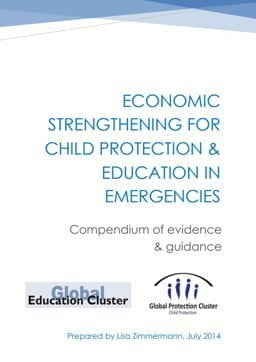
Economic Strengthening for Child Protection & Education in Emergencies
Guidelines and Tools
The aim of this compendium is to provide education and child protection coordinators and partners working in the field who are involved in or confronted with economic strengthening programmes with key existing evidence and guidance documents in order to inform their work, at all stages of a programme...

A Double-edged Sword: Livelihoods in emergencies guidance and tools for improved programming
Guidelines and Tools
This document aims to help economic development practitioners who design economic strengthening projects with the particular aim of improving child wellbeing and for others whose aim is poverty alleviation more broadly. The guidance presented is based on the understanding that: 1. Household economic...
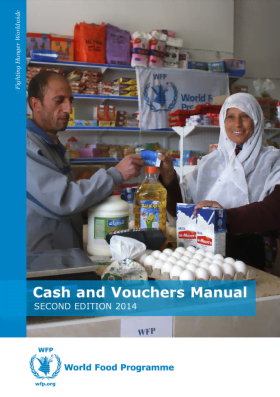
Cash and Vouchers Manual – Second edition
Guidelines and Tools
This second edition of the Cash and Vouchers Manual captures the latest corporately endorsed business processes and procedures, providing the most up-to-date tools (i.e. analytical, assessment, monitoring) that have been developed through close intra-departmental collaboration between Headquarters...
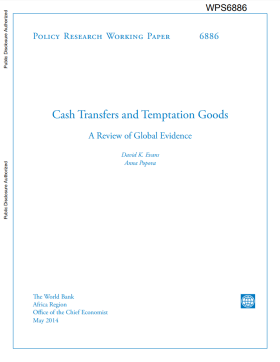
Cash Transfers and Temptation Goods: A review of global evidence
Report
Cash transfers have been demonstrated to improve education and health outcomes and alleviate poverty in various contexts. However, policy makers and others often express concern that poor households will use transfers to buy alcohol, tobacco, or other “temptation goods”. This paper reviews 19...
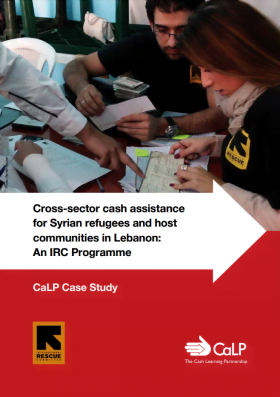
Cross-Sector Cash Assistance for Syrian Refugees and Host Communities in Lebanon: An IRC Programme
Report
Since January 2013, the International Rescue Committee (IRC) has been implementing a project providing humanitarian assistance to the Syrian refugees in Lebanon. This project provided unconditional financial assistance to targeted Syrian refugees and Lebanese host households to help them be better...

Factors Affecting the Cost-efficiency of Electronic Transfers in Humanitarian Programmes
Report
Led by Oxford Policy Management (OPM) with support from Concern Worldwide, this research aims to answer the key question: Are electronic transfers more cost-efficient than traditional manual based cash delivery methods, and under what conditions? Cash is increasingly offered to households in...

Unconditional Cash Assistance via E-Transfer: Implementation lessons learned – Winterization support via CSC bank ATM card
Report
This document looks at the lessons learned from the Danish Refugee Council’s e-transfer programme designed to provide cash assistance to Syrian refugees in Lebanon using the CALP Network’s guidelines on e-transfers in emergencies as a point of reference for assessing adherence to best practices.
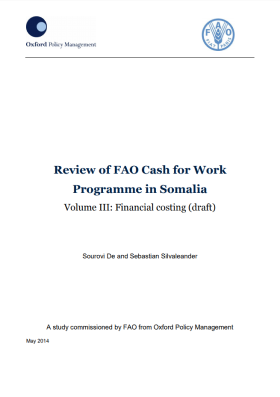
Review of FAO Cash for Work Programme in Somalia
Report
The objective of this costing study is to understand the absolute and relative magnitudes of various drivers of programme costs and to assess the cost-efficiency of the CFW Programme’s operations, using the total cost-to-transfer ratio (TCTR) for the programme which represents the total cost incurred by...
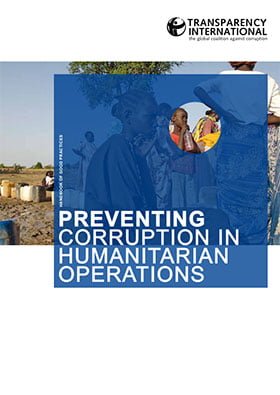
Preventing Corruption in Humanitarian operations
Guidelines and Tools
Transparency International (TI) has long held that the most damaging impact of corruption is the diversion of basic resources from poor people. Corruption in humanitarian aid is the most egregious form of this, as it deprives the most vulnerable poor people, the victims of natural disasters and civil...

Cash Emergency Preparedness (CEP) Assessment: Myanmar
Policy paper
Cash transfer programming (CTP) in emergencies is not new in Myanmar, with the first examples going back at least to Cyclone Nargis in 2009. CTP has also been used in humanitarian settings such as Kachin State. However, CTP is not yet being widely used for the current conflict context in Rakhine State due...
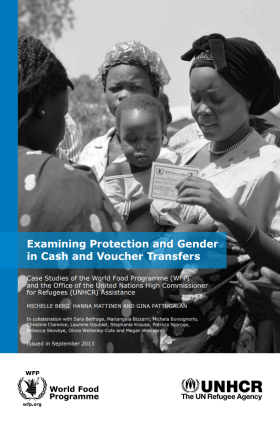
Examining Protection and Gender in Cash and Voucher Transfers
Case Study
With cash and voucher transfers increasing as a form of humanitarian assistance, the World Food Programme (WFP) and the UN Refugee Agency (UNHCR) teamed up to study the potential protection and gender impact of such transfers. While much research had been done about economic and market impacts of cash and...
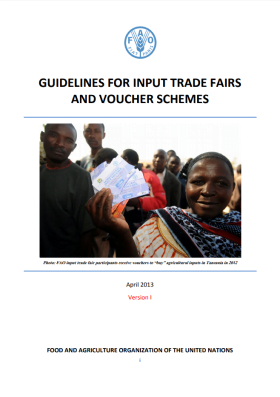
Guidelines for Input Trade Fairs and Voucher Schemes
Guidelines and Tools
One of the main causes of food insecurity for farmers in rural areas is limited access to agricultural inputs. The Food and Agriculture Organization of the United Nations (FAO) works to set up input trade fairs and voucher schemes to provide poor, vulnerable and food insecure farmers with access to the...

Guidelines for Public Works Programmes: Cash‐, Voucher‐ and Food-for‐Work
Guidelines and Tools
The Food and Agriculture Organization of the United Nations (FAO) manages public works programmes to provide transfers to vulnerable, food-insecure and/or crisis-affected households in return for the provision of labour (particularly through labour-intensive construction and...
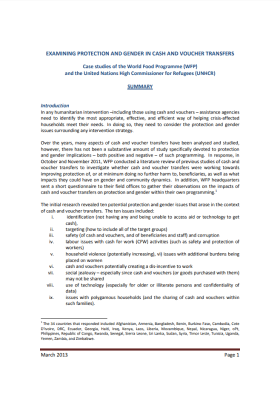
Examining Protection and Gender in Cash and Voucher Transfers – Summary
Report
In any humanitarian intervention – including those using cash and vouchers – assistance agencies need to identify the most appropriate, effective, and efficient way of helping crisis-affected households meet their needs. In doing so, they need to consider the protection and gender issues surrounding...
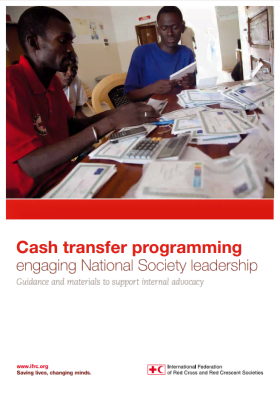
Cash Transfer Programming Engaging National Society Leadership: Guidance and materials to support internal advocacy
Guidelines and Tools
This guidance provides the materials required to run an awareness session for senior representatives of a National Society on the nature of cash transfer programming, its challenges and benefits. National Societies work in different contexts and as such the materials will need to be adapted to suit the...
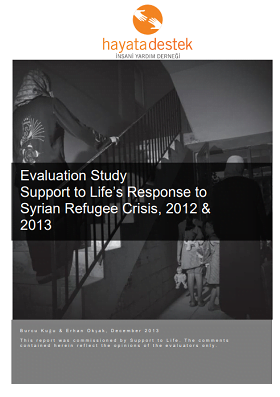
Evaluation Study Support to Life’s Response to Syrian Refugee Crisis, 2012 & 2013
Report
This report is part of enhancing Support to Life’s organisational learning on its Syrian Refugee Programme in Turkey. The specific objective of the evaluation is to present the findings on the achievements, quality and overall impact of Support to Life’s humanitarian response of the Syrian refugee...
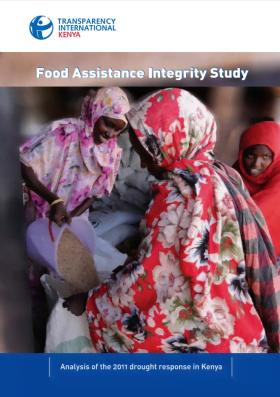
Food Analysis Integrity Study: Review of the 2011 drought response in Kenya
Report
Using four case studies from the 2011 drought response in Kenya, the Food Assistance Integrity Study by Transparency International Kenya analyses the impact of diversion and corruption on different types of food assistance. The study aims to enhance the accountability, efficiency and cost effectiveness of...

Logistics and Administration Guideline for Cash Based Interventions – Annexes
Guidelines and Tools
These annexes are designed to be used alongside the Logistics and Administration Guideline for Cash Based Interventions, which aims to support logisticians and administrators to successfully support cash based interventions (CBIs) and to help technical departments too. The annexes include: a the CALP...
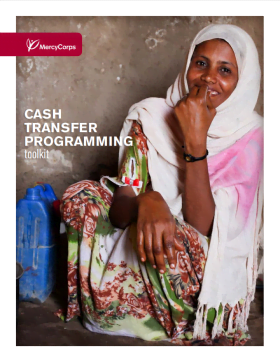
Cash Transfer Programming Toolkit
Guidelines and Tools
The Cash Transfer Programming (CTP) Toolkit is a basic guide to cash transfer programming in emergency response and early recovery settings. The publication is based upon best practiced and practical experience from Mercy Corps programmes. The Toolkit provides general guidance for CTP, as well as...
